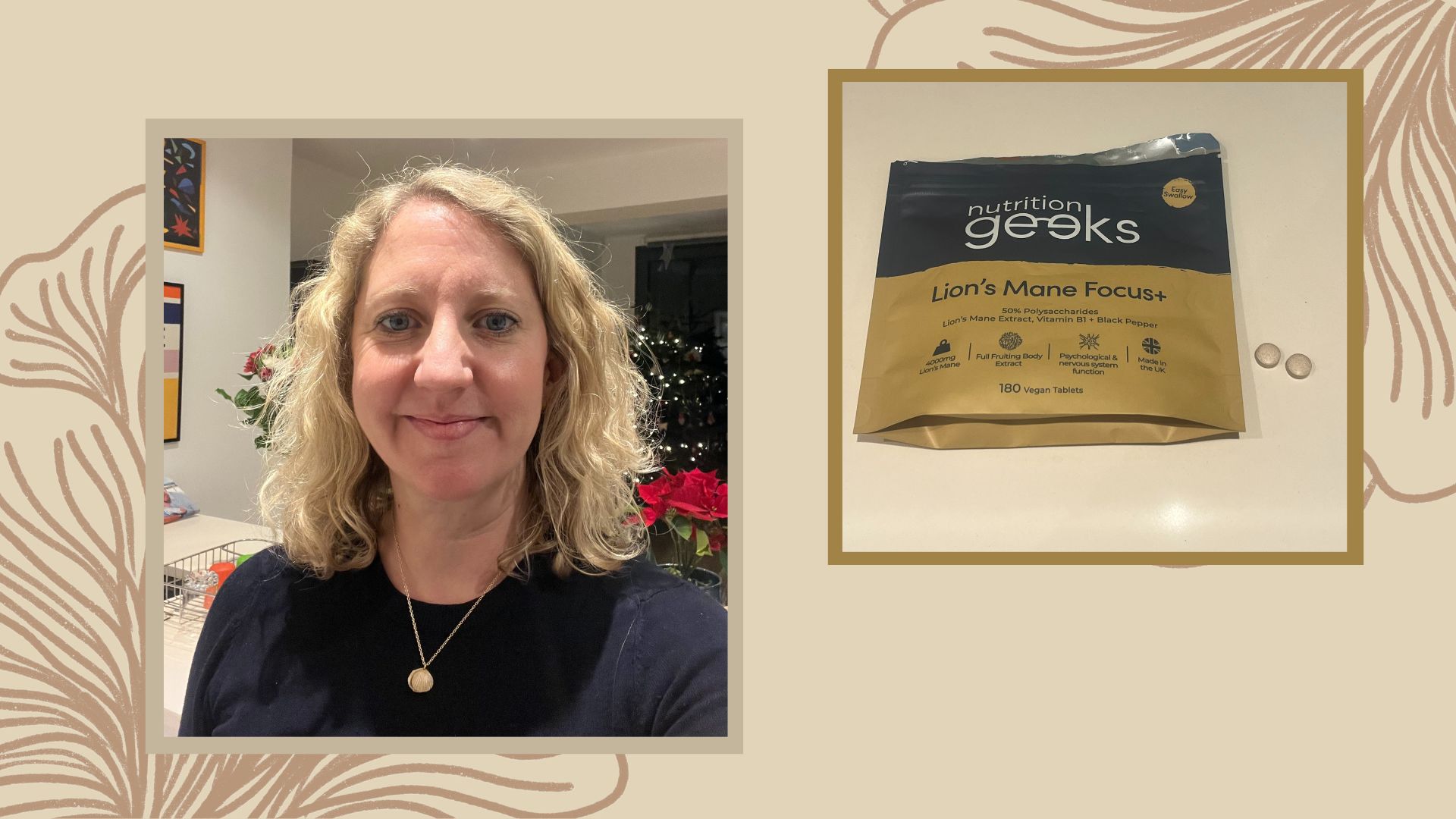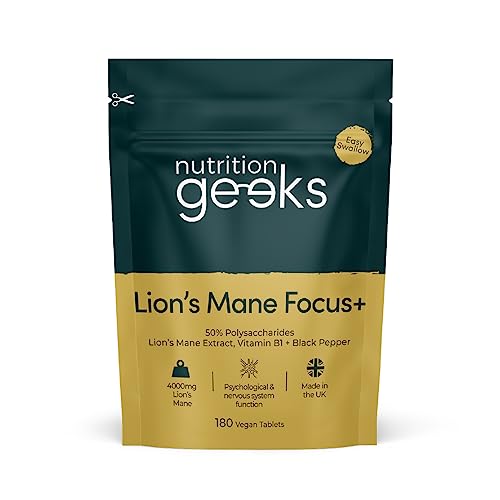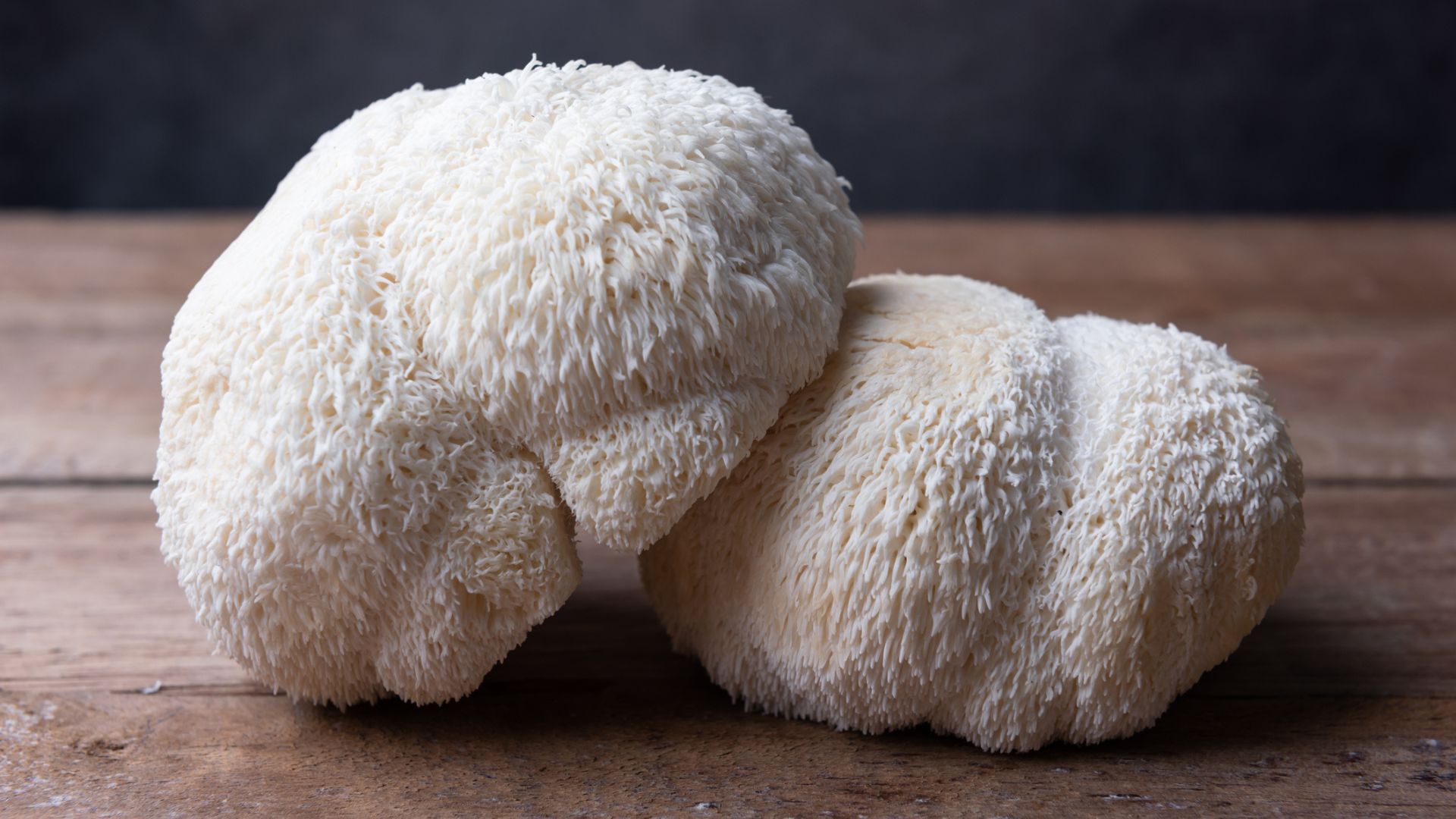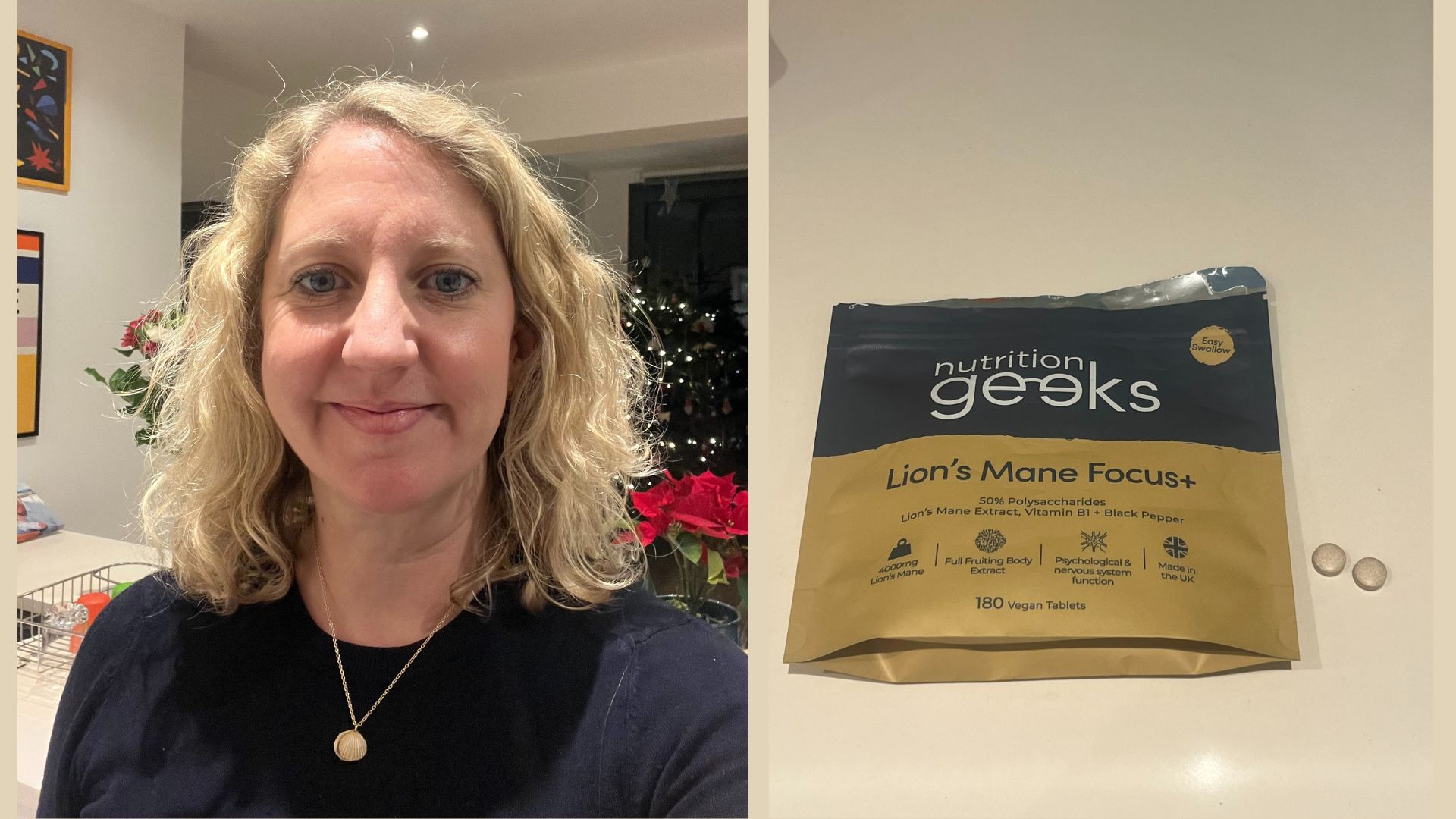I tried taking lion's mane for my menopausal brain fog - and now I get why everyone's talking about it
Kat Storr started taking lion's mane for her menopausal brain fog and hasn't looked back since, it's been so transformative. Here are the benefits she found in two weeks...

This mushroom has been shown to boost cognitive function, memory, and mental clarity - so are there benefits of eating or drinking lion's mane for brain fog in perimenopause? Health Writer Kat Storr finds out.
Lion’s mane (hericium erinaceus) is a type of mushroom that, as the name suggests, resembles the mane of a lion. It mainly grows in East Asia and has been used as a food and herbal medicine in traditional Chinese medicine for centuries. It's recently become popular among those of us experiencing menopause symptoms like brain fog, where you forget words mid-sentence or what you did at the weekend (and it's only Monday).
I’ve always been quite proud of my ability to remember conversations and facts or information about people. However, in recent years my mental clarity has started to fade and my brain just doesn’t feel as reliable. I started to wonder if there were ways to improve my menopausal brain fog from the inside. ie. What could I add to my daily supplement regime to help with this? That’s when I started reading about lion’s mane and the positive impact it’s reported to have on some people’s memory and general cognitive function.
Lion's mane for brain fog - does it work?
Yes, the experts say, lion's mane may very well help ease brain fog in some people with perimenopause symptoms. "It contains compounds that may promote nerve growth and improve brain health, and it's been shown to support memory and focus," says Helen Bell, a nutritionist at UK Care Guide. "Studies have also shown it may help reduce brain inflammation, which can be beneficial for cognitive clarity."
Alongside brain fog, nutritionist Michaella Mazzoni says she has been using the mushroom to support "cognition and focus in those with ADHD, long Covid, post-viral conditions, and MS. Some studies have also suggested a potential benefit [of lion's mane] for supporting mental health too".
Brain fog, low mood, sleep problems and memory loss can be very frustrating to deal with, which is why many of us turn to supplements to try and alleviate these symptoms.
Lion’s mane can be ingested in different ways such as gummies, tablet supplements, as a tincture, or as a powder in drinks such as coffee, tea and smoothies. It can also be grilled or sauteed and eaten - but it’s quite rare to find it in the wild in the UK.
Sign up to our free daily email for the latest royal and entertainment news, interesting opinion, expert advice on styling and beauty trends, and no-nonsense guides to the health and wellness questions you want answered.

I chose the Nutrition Geeks Lion’s Mane Focus+ vegan tablets. The recommended serving (2 tablets) contains 4000mg (50% polysaccharides) of lion’s mane, plus 4.4mg of vitamin B1 (thiamine) and black pepper for an extra boost for the nervous system and psychological function. They’re small and easy to swallow, with no bitter taste. Other options are also available.

Stir your lion's mane into coffee, tea, or hot chocolate, or whizz it into your protein shake in the morning with this powder from mushroom specialist Dirtea. It's worth noting that this powder has about half the lion's mane dose per serving as the Nutrition Geeks tablets and doesn't contain vitamin B, so if you want to start with a lower amount of pure lion's mane and work your way up, this could be a good way to do it.
Benefits I found after taking lion's mane for brain fog
Starting the tablets in the middle of November in the lead-up to Christmas and a lot of family birthdays, felt like the right time. My brain gets completely overloaded at this time of year and the perimenopause-induced foggy symptoms I’d been experiencing over the past few months weren’t going to get any better with the extra stress.
I took the tablets with water before bed each night to try and lower my stress levels naturally, and because I sometimes have trouble sleeping. I wanted to see if they could work as a natural insomnia cure. This time of day is also when I take my other supplements, so it was easy to just add these to the ever-growing pile.
I soon discovered that the impact of taking lion’s mane can be quite significant.
1. Better mood
I’m a generally positive, happy person but when life can feel too much or I’m tired, I start to experience the early signs of burnout. I lose my patience with my family easily or get moody. These mood swings have become worse as I’ve got older so I was interested in seeing if lion’s mane would make a difference.
It probably took me a week of taking the tablets before I noticed the improvement in my mood. There were fewer incidents of me getting angry or stressed and everything felt on a much more even keel emotions-wise. I felt like I was better at handling stressful situations and was generally happier. There were a few tough situations to deal with - such as family illness - but I found it easier to stay positive and not become overly anxious. This had not been the case before taking lion’s mane when I would easily catastrophise and panic about these situations.
2. Sharper focus
Stress and brain fog often go hand-in-hand and I’ve found I’ve been suffering from this more as life gets increasingly complicated and busy. Some weeks I can feel like I’m dropping balls all over the place - forgetting appointments, leaving birthday presents to the last minute, and more.
However, once I started taking lion’s mane I felt like my brain was more switched on. I would wake up feeling alert and positive about the day. Getting ready for the school run with my three sons felt much less fraught because I was more organised and less scatterbrained.
Away from family life, I also felt like I was a lot more productive when tired. I work from home and can be prone to procrastination and distraction. However, after a few days of taking these tablets, I found that my concentration had really improved. I could focus on one task at a time and complete it before moving on to the next thing.

Lion's mane mushroom (as pictured) can be grilled or steamed but it's very rarely found raw in the UK.
3. Stronger immune system
Research into the benefits of lion’s mane, particularly on humans, is still developing but some studies published in the Food and Function Journal have shown taking lion's mane can increase the activity of your intestinal immune system, which can help protect you from germs that enter the gut through your mouth or nose.
Admittedly, it's hard to know how my health would have been if I didn't take the lion's mane. However, it’s winter and everyone around me is sniffing or coughing, including my children and husband - but I've managed to avoid them. I’ve dodged all of the bugs going around - even those inside my house - and have felt healthy and energised. In turn, this has given me the motivation to get back to exercising regularly and eating well, which is always difficult in the festive season.
The anti-inflammatory and antioxidant properties in lion’s mane can also help support your immune system and give your gut extra protection - provided you start taking it well before you notice any symptoms.
However, always consult your GP before adding any new supplements to your routine and always read the label. Lion's mane isn't suitable for everyone.
4. Improved sleep
I'm always eager to know how to sleep better, being a light and restless sleeper. It could be the consequence of having three children but I find it hard to switch my brain off at night. There's also a strong link between menopause and insomnia.
I didn’t notice an immediate impact after taking the lion's mane but again, after a week or so, I realised that I was getting to sleep much faster. The tossing and turning had eased and I was also sleeping through the night a lot better. My sleep felt deeper too, which is probably why I was waking up feeling more alert and positive.
I am also taking other supplements that have been shown to improve sleep, such as magnesium, so I was pleasantly surprised to see that taking the lion's mane made a tangible difference.

Kat Storr experienced great benefits of lion's mane for brain fog with Nutrition Geeks.
The w&h verdict
I was quite dubious about the benefits of lion’s mane before I started taking it. The amount of supplements marketed towards perimenopausal women feels overwhelming, and I already take a couple, so I was reluctant to add another one to my daily routine. But now, I'm never going back.
The fact that I’ve experienced a noticeable difference in my mood, cognitive function and sleep means I will definitely continue to take it daily, and will also be telling all of my friends about it too.
Who can't take lion's mane?
While lion’s mane is generally considered safe, there are some people who should avoid taking it for health reasons. Kate Booker, nutritionist at Nutrition Geeks, says it should be avoided by anyone who is allergic to mushrooms. If you’re pregnant or breastfeeding, you should check with your GP or midwife because insufficient information exists on its safety in these circumstances.
Booker says lion’s mane can stimulate the immune system so “people with autoimmune conditions like lupus, rheumatoid arthritis, or multiple sclerosis should consult their doctor before use”.
Sanchez adds that “people taking specific medications for blood thinning (eg. warfarin), thyroid or high cholesterol should avoid lion's mane unless advised by a healthcare provider”.
This article is for general interest and is not intended to suggest a course of action that might be suitable for you. Always consult a licensed healthcare professional before making decisions concerning your health and wellbeing.

Kat Storr has been a digital journalist for over 15 years after starting her career at Sky News, where she covered everything from world events to royal babies and celebrity deaths. After going freelance eight years ago, she now focuses on women's health and fitness content, writing across a range of UK publications.
From perimenopause to the latest fitness trends, Kat loves researching and writing about it all. She's happy to give any fitness challenge a go and speaks to experts about wellbeing issues affecting people every day.
